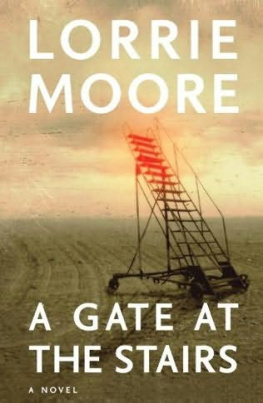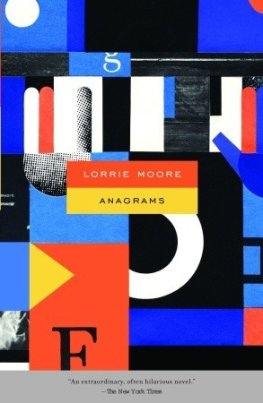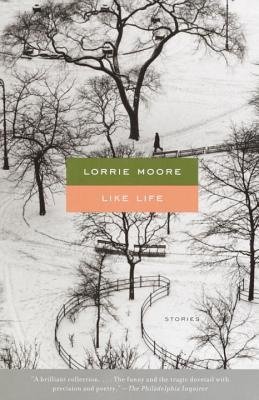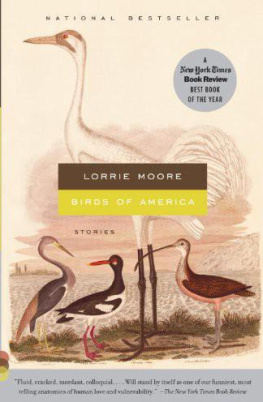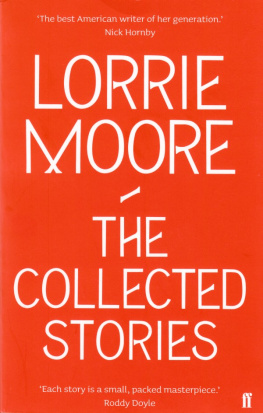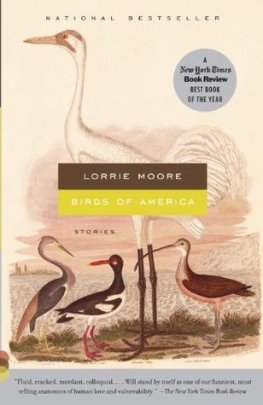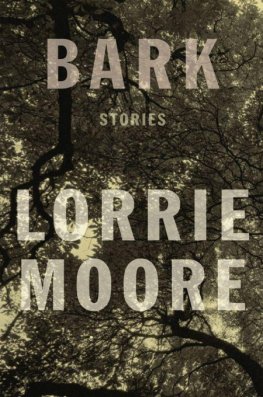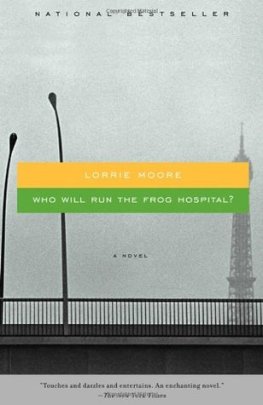Acknowledgments
For their myriad insights, my deepest appreciation goes to Max Garland and Charles Baxter. Also for their help, many thanks to Ashley Allen, David McLimans, Elizabeth Rea, the Emily Mead Baldwin family, the University of Wisconsin Arts Institute, the UW Graduate Research Committee, and the WISELI/Vilas program. My boundless gratitude, too, to the Lannan Foundation.
Also by Lorrie Moore
Birds of America
Who Will Run the Frog Hospital?
Like Life
Anagrams
Self-Help
I
T he cold came late that fall and the songbirds were caught off guard. By the time the snow and wind began in earnest, too many had been suckered into staying, and instead of flying south, instead of already having flown south, they were huddled in peoples yards, their feathers puffed for some modicum of warmth. I was looking for a job. I was a student and needed babysitting work, and so I would walk from interview to interview in these attractive but wintry neighborhoods, the eerie multitudes of robins pecking at the frozen ground, dun-gray and strickenthough what bird in the best of circumstances does not look a little strickenuntil at last, late in my search, at the end of a week, startlingly, the birds had disappeared. I did not want to think about what had happened to them. Or rather, that is an expressionof politeness, a false promise of delicacyfor in fact I wondered about them all the time: imagining them dead, in stunning heaps in some killing cornfield outside of town, or dropped from the sky in twos and threes for miles down along the Illinois state line.
I was looking in December for work that would begin at the start of the January term. Id finished my exams and was answering ads from the student job board, ones for childcare provider. I liked childrenI did!or rather, I liked them OK. They were sometimes interesting. I admired their stamina and candor. And I was good with them in that I could make funny faces at the babies and with the older children teach them card tricks and speak in the theatrically sarcastic tones that disarmed and enthralled them. But I was not especially skilled at minding children for long spells; I grew bored, perhaps like my own mother. After I spent too much time playing their games, my mind grew peckish and longed to lose itself in some book I had in my backpack. I was ever hopeful of early bedtimes and long naps.
I had come from Dellacrosse Central High, from a small farm on the old Perryville Road, to this university town of Troy, the Athens of the Midwest, as if from a cave, like the priest-child of a Colombian tribe Id read about in Cultural Anthropology, a boy made mystical by being kept in the dark for the bulk of his childhood and allowed only storiesno experienceof the outside world. Once brought out into light, he would be in a perpetual, holy condition of bedazzlement and wonder; no story would ever have been equal to the thing itself. And so it was with me. Nothing had really prepared me. Not the college piggy bank in the dining room, the savings bonds from my grandparents, or the used set of World Book encyclopedias with their beautiful color charts of international wheat production and photographs of presidential birthplaces. The flat green world of my parents hogless, horseless farmits dullness, its flies, its quiet ripped open daily by the fumes and whining of machinerytwisted away and left me with a brilliant city life of books and films and witty friends. Someone had turned on the lights. Someone had led me out of the caveof Perryville Road. My brain was on fire with Chaucer, Sylvia Plath, Simone de Beauvoir. Twice a week a young professor named Thad, dressed in jeans and a tie, stood before a lecture hall of stunned farm kids like me and spoke thrillingly of Henry Jamess masturbation of the comma. I was riveted. I had never before seen a man wear jeans with a tie.
The ancient cave, of course, had produced a mystic; my childhood had produced only me.
In the corridors students argued over Bach, Beck, Balkanization, bacterial warfare. Out-of-state kids said things to me like Youre from the country. Is it true that if you eat a bears liver youll die? They asked, Ever know someone who did you-know-what with a cow? Or Is it an actual fact that pigs wont eat bananas? What I did know was that a goat will not really consume a tin can: a goat just liked to lick the paste on the label. But no one ever asked me that.
From our perspective that semester, the events of Septemberwe did not yet call them 9/11seemed both near and far. Marching poli-sci majors chanted on the quads and the pedestrian malls, The chickens have come home to roost! The chickens have come home to roost! When I could contemplate them at allthe chickens, the roostingit was as if in a craning crowd, through glass, the way I knew (from Art History) people stared at the Mona Lisa in the Louvre: La Gioconda! its very name like a snake, its sly, tight smile encased at a distance but studied for portentous flickers. It was, like September itself, a cats mouth full of canaries. My roommate, Murpha nose-pierced, hinky-toothed blonde from Dubuque, who used black soap and black dental floss and whose quick opinions were impressively harsh (she pronounced Dubuque Du-ba-cue) and who once terrified her English teachers by saying the character she admired most in all of literature was Dick Hickock in In Cold Bloodhad met her boyfriend on September tenth, and when she woke up at his place, shed phoned me, in horror and happiness, the television blaring. I know, I know, she said, her voice shrugging into the phone. It was a terrible price to pay for love, but it had to be done.
I raised my voice to a mock shout. You sick slut! People were killed. All you think about is your own pleasure. Then we fell into a kind of hysteriafrightened, guilty, hopeless laughter I have never actually witnessed in women over thirty.
Well, I sighed, realizing I might not be seeing her all that much from then on in, I hope theres just hankyno panky.
Nah, she said. With panky theres always tears, and it ruins the hanky. I would miss her.
Though the movie theaters closed for two nights, and for a week even our yoga teacher put up an American flag and sat in front of it, in a lotus position, eyes closed, saying, Let us now breathe deeply in honor of our great country (I looked around frantically, never getting the breathing right), mostly our conversations slid back shockingly, resiliently, to other topics: backup singers for Aretha Franklin, or which Korean-owned restaurant had the best Chinese food. Before Id come to Troy, I had never had Chinese food. But now, two blocks from my apartment, next to a shoe-repair shop, was a place called the Peking Caf where I went as often as I could for the Buddhas Delight. At the cash register small boxes of broken fortune cookies were sold at discount. Only cookie broken, promised the sign, not fortune. I vowed to buy a box one day to see what guidanceobscure or mystical or mercenary, but Confucian!might be had in bulk. Meanwhile, I collected them singly, one per every cookie that came at the end atop my check, briskly, efficiently, before Id even finished eating. Perhaps I ate too slowly. Id grown up on Friday fish fries and green beans in butter (for years, my mother had told me, margarine, considered a foreign food, could be purchased only across state lines, at oleo stands hastily erected along the highway PARK HERE FOR PARKAY read the signsjust past the Illinois governors welcome billboard, farmers muttering that only Jews bought there). And so now these odd Chinese vegetablesfungal and gnomic in their brown saucehad the power for me of an adventure or a rite, a statement to be savored. Back in Dellacrosse the dining was divided into Casual, which meant you ate it standing up or took it away, and the high end, which was called Sit-Down Dining. At the Wie Haus Family Restaurant, where we went for sit-down, the seats were red leatherette and the walls were covered with the local

